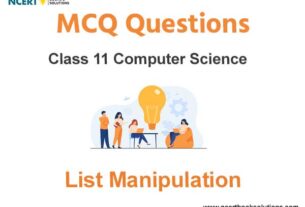Check the below NCERT MCQ Class 11 Political Science Chapter 5 Rights with Answers available with PDF free download. MCQ Questions for Class 11 Political Science with Answers were prepared based on the latest syllabus and examination pattern issued by CBSE, NCERT and KVS. Our teachers have provided below Rights Class 11 Political Science MCQs Questions with answers which will help students to revise and get more marks in exams
Rights Class 11 Political Science MCQs Questions with Answers
Refer below for MCQ Class 11 Political Science Chapter 5 Rights with solutions. Solve questions and compare with the answers provided below
Question. Right to franchise is a
(a) Customary rights.
(b) Political right.
(c) Moral rights.
(d) Cultural right.
Answer
B
Question. Marx gave priority, to
(a) Political rights
(b) Economic rights
(c) Cultural rights
(d) None of these.
Answer
B
Question. What is the force behind Legal Rights?
(a) Force of public opinion
(b) Force of morality
(c) Force of law
(d) Force of nature
Answer
C
Question. Natural Rights are those which are given to us by:
(a) Constitution
(b) Parliament
(c) God or Nature
(d) King
Answer
C
Question. In a state, it is also the duty of the citizens to
(a) Ensure sustainable development.
(b) Protect the atmosphere.
(c) Pollute air and water.
(d) Live in peace.
Answer
A
Question. Human rights, traditionally are divided into
(a) Political and economic rights.
(b) Political and social rights on one hand and cultural rights on the other.
(c) Civil and political rights.
(d) Civil and political rights on one hand and the right to development on the other.
Answer
C
Question. what are rights?
(a) entitlements
(b) claims
(c) both of the above
(d) none of the above
Answer
C
Question. natural rights are:
(a) rights derived from nature
(b) rights because we are humans
(c) rights given by state
(d) none of the above
Answer
A
Question. Freedom of expression is important for
(a) A state.
(b) A democratic government.
(c) Communist society.
(d) An individual livelihood.
Answer
B
Question. Who said “Rights are those conditions of social life without which no man can seek to be himself at his best ?”
(a) Austin
(b) Wilde
(c) Green
(d) Laski
Answer
D
Question. In which year UN Human Right Declaration was passed.
(a) 10th Dec, 1948
(b) 10th Feb, 1949
(c) 1st May, 1950
(d) 21st July, 1948.
Answer
A
Question. According to the German philosopher Immanuel Kant, human beings unlike other objects are:
(a) Useful
(b) Valuable
(c) Selfish
(d) Independent
Answer
B
Question. The constitution of a country provides the basis for
(a) Punishment of criminals
(b) Diplomatic relations with other countries
(c) Relationship between citizens
(d) Governance of the country
Answer
D
Question. Which of the following is not a Fundamental Right?
(a) Right to Equality
(b) Right to Property
(c) Right to Freedom
(d) Right Against Exploitation
Answer
B
Question. The provision to abolish untouchability is reflected in the Indian constitution under
(a) Article 14
(b) Article 15
(c) Article 16
(d) Article 17
Answer
D
Question. Civil liberties and political rights form the basis of a
(a) Democratic government
(b) Monarchical rule
(c) Totalitarian government
(d) Dictator rule
Answer
A
Question. Right to Liberty is mentioned in Articles:
(a) 19 to 22
(b) 14 to 18
(c) 25 to 28
(d) 23 to 24
Answer
A
Question. The political right is the right to
(a) Shelter
(b) Sustainable development
(c) Livelihood
(d) Form political parties
Answer
D
Question. A Bill of Rights is enshrined in the
(a) Preamble of the UNO
(b) Constitution of many countries
(c) Human rights of UNESCO
(d) Government documents of few countries
Answer
B
Question. rights and responsibilities go hand in hand because:
(a) respect other people’s rights
(b) citizens to be vigilant on restrictions on rights
(c) common good important
(d) all of the above
Answer
D
Question. Civil Rights are given to the Individual by:
(a) Nature
(b) God
(c) The state
(d) The people
Answer
C
Question. The natural right that was not advocated by the political theorists of the 17th and 18th centuries was the right to
(a) Life
(b) Liberty
(c) Information
(d) Property
Answer
C
Question. which organisation adopted universal declaration of human rights?
(a) security council
(b) general assembly
(c) trusteeship council
(d) international court of justice
Answer
A

We hope you liked MCQ Class 11 Political Science Chapter 5 Rights with answers provided above. In case you have any questions please post them in the comments section below and our Political Science teachers will provide a response.


